|
As he was clearly a natural, and showed himself as one from the outset, it's hard to credit that Jerzy Skolimowski (born in 1938 in Łódź) showed little or no interest in cinema before around the age of twenty. By the time he turned thirty, he had directed five feature films, one of which was suppressed by the Polish authorities and did not have a release until 1981, of which more below. This release comprises two of them. Walkover (Walkower, 1965) and Barrier (Bariera, 1966) are due as I write this to be released on Blu-ray by Second Run, which will make all of the films of the first Polish phase of Skolimowski's career available in the UK.
Skolimowski was a child during World War II, and his father, who was in the Polish Resistance, was shot by the Germans. After the War, his mother became a cultural attaché at the Polish embassy in Prague. Skolimowski's schoolmates at the time included two future Czech film directors, Miloš Forman and Ivan Passer, and a future playwright and president, Václav Havel. Skolimowski's interests were writing (poetry, short stories, a play) and was a jazz enthusiast. His love of that music is reflected in both of these films, which both have jazz scores by Krzysztof Sadowski and Krzysztof Komeda (who also worked with Roman Polański) respectively. Skolimowski was also an amateur boxer. However, he met Andrzej Wajda and as a result was asked to look at the script for Wajda's forthcoming film Innocent Sorcerers (Niewinni czarodzieje, 1960) as he was much nearer the age of the main characters than Wajda and his cowriter, Jerzy Andrzejewski, were. Skolimowski made many changes to the script and was credited as cowriter. Skolimowski also had an uncredited acting role as a boxer.
Skolimowski then went to film school in his native Łódź. He cowrote Polański's Knife in the Water (Nóż w wodzie, 1962), which was the first Polish film to be Oscar-nominated as Best Foreign-Language Film. While at film school, Skolimowski made a number of short films, but he always had in mind a feature film, which he used the school's facilities and film stock to make piecemeal. With all the sections joined together, he had his first feature film completed while still at school.
| IDENTIFICATION MARKS: NONE |
|
Identification Marks: None (Rysopis, which translates as "Description", though in his commentary Michał Olesczyk translates it as "a portrait drawn from memory") was released in 1964. As well as writing the film, Skolimowski played the lead role, Andrzej Leszcyc. At the beginning of the film, Leszczyc is a university student studying ichthyology but has abandoned his thesis. He signs up for military service, despite being exempt as a student. The film takes place in the few hours before he has to leave, and his encounters with Teresa, the woman he lives with and who is more or less indifferent to him, and an acquaintance who works as a door-to-door salesman and describes the reception he sometimes gets from lonely housewives – something which doesn't quite happen to Andrzej, and Barbara, a female student who is about to start at University and is much less disillusioned than him but who we suspect may well become so in her turn. Andrzej is of a generation too young to remember the war and at odds with an older one who remembered it with if anything nostalgia despite its obvious horror, for example the scene where Andrzej meets an older man, a veteran of the 1944 Warsaw Rising. The film very specifically takes place on 1 September, the anniversary of the outbreak of the War.
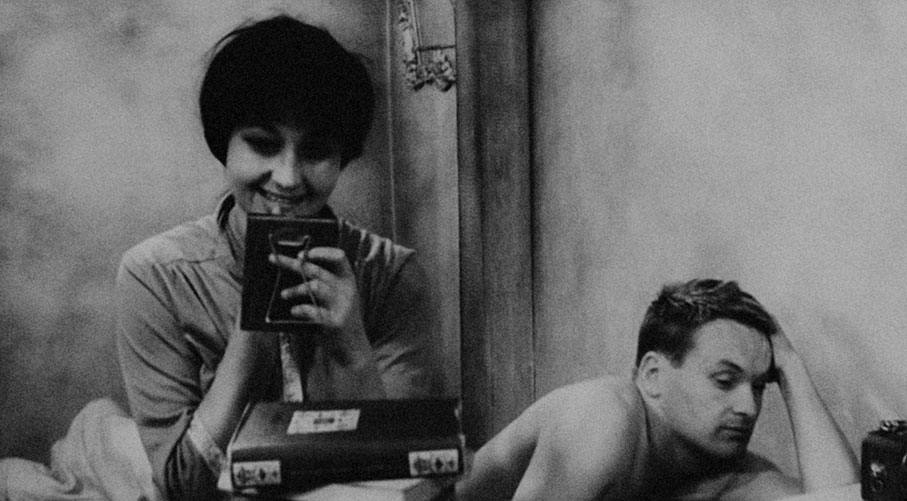
Like Walkover and Barrier, this is a young man's film, the work of someone clearly bursting with an urge to show what he could do. As with the other films, there's quite a lot of influence from the French New Wave but plenty of stylistic flourishes of Skolimowski's own. There are some impressive long takes, one going down all the flights of a staircase and another following Andrzej and Barbara on a walk-and-talk through a timber yard. Many of the film's stylistic devices were new to Polish cinema, and were more akin to what French films were doing at the height of the New Wave, though Skolimowski claimed not to have been aware of their work at the time. The film is also about being a young man, with Andrzej trying on different identities (or telling different stories to different people) to see which if any of them fit. It's very impressive. Skolimowski would continue his use of long sequence-shots in Walkover, which contains all of twenty-nine shots in its seventy minutes.
All three principal female roles are played by Elżbieta Czyżewska, who was Skolimowski's wife at the time. Casting himself and his wife in the lead roles was due to expediency if nothing else. Nine days younger than Skolimowski, Czyżewska was the more famous of the couple at the time, having made several films by this point and also working on the stage. She can be seen in, among others, Wojciech Has's The Saragossa Manuscript (Rękopis znaleziony w Saragossie, 1965) and Wajda's Everything for Sale (Wszystko na spezedaż, 1969). She and Skolimowski divorced in 1965 and with her second husband, David Halberstam, she moved to the United States and continued to act there. Sally Kirkland's Oscar-nominated role in Anna (1987) is based on her life, and her friend Meryl Streep modelled her role, and accent, in Sophie's Choice (1982) on her, winning an Oscar as a result. Czyżewska died in 2010.
Identification Marks: None had a delayed journey to UK cinemas, opening in 1969 after Walkover, Barrier and the Belgian-made, French-language (which Skolimowski didn't speak at the time) Le départ had been shown here.
Hands Up! (Ręce do góry) was made in 1967, the same year as Le départ, and it has had a complex history. Like all his early films it was made quickly: shot in twenty-two days and edited in one. It was banned by the Polish authorities and in return Skolimowski threatened never to make another film in Poland again while the film remained suppressed. That cut no ice, so Skolimowski left Poland and for the next four decades lived and worked abroad. His films outside Poland included some of his best, such as Deep End (1970), The Shout (1978) and the very-quickly-shot Moonlighting (1982), which featured Polish workers stranded in London when martial law was declared in Poland, something concealed from them by their leader (played by Jeremy Irons). Other films were less successful, not least in their director's estimation. Skolimowski made another film in Poland with Four Nights with Anna (Cztery noce z Anną, 2008), which ended a seventeen-year hiatus in his directing career. He has since made three more in his native country: Essential Killing (2011), 11 Minutes (11 minut, 2015) and EO (2022).
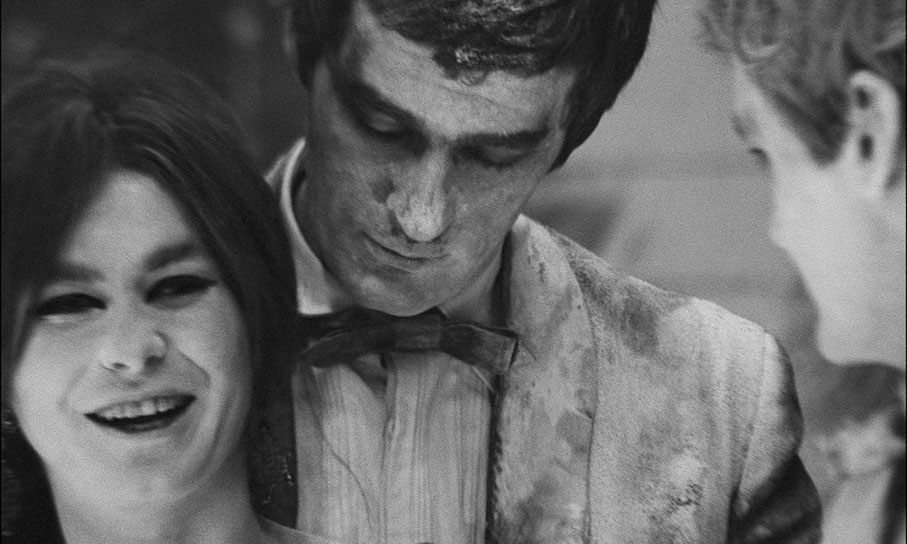
With the brief thaw in Poland in 1981, Hands Up! could finally be shown, and it was shown out of competition at Cannes. Clearly Skolimowski thought he had moved on in the fourteen years that the film had been banned. The film as it stands now could fairly be a film of, if not two halves, a third and two thirds. Skolimowski reduced the length of the black and white 1967 film to around fifty-five minutes and shot a twenty-five-minute prologue in colour. Along with some overtly symbolic passages, we see Skolimowski addressing to camera the Polish censor who, he says, destroyed his confidence. We see Skolimowski on location in a blitzed Beirut for his acting role in Volker Schlöndorff's 1981 film Circle of Deceit (Die Fälschung, which the subtitles translate literally as The Forgery, but that's not its English-language title). We also see him in London, with protestors sympathetic to the Polish trade union Solidarity, and we see glimpses of some of his friends, including Jane Asher (star of Deep End) and her husband Gerald Scarfe, Alan Bates (star of The Shout), Fred Zinnemann and others. Some early showings in Poland omitted this prologue, and printed the black and white footage of the main feature in sepia.
Then we cut to the original film, from colour to black and white, as all of Skolimowski's films up to that point were made. Andrzej Leszczyc had been something of an alter ego for Skolimowski, who had played him in Walkover and this film as well as in Identification Marks: None. (Jan Nowicki played the role in Barrier.) Here Andrzej has a reunion with some of his student friends, ten years after they graduated. They were students at the height of Stalinism in Poland. The friends call each other by the makes of the cars they drive, so Andrzej is Zastawa. A married couple (Joanna Szczerbic, at the time Skolimowski's wife, and Adam Hanuskiewicz) are Mr and Mrs Alfa Romeo. Tadeusz Łomnicki is Opel Rekord and Bogumil Kobiela is Wartburg. As the evening progresses, the group drink and take drugs (or do they?) in the cattle truck of a freight train, which may have taken a previous generation more than two decades earlier to the death camps. The film contains many satirical jabs at the Polish society of the time. The film has no plot to speak of, and is akin to experimental theatre and other films based on it. (In his commentary, Michał Olesczyk mentions Peter Brook's 1967 film of his stage success The Marat/Sade, from the play by Peter Weiss.) Some of the references may be opaque to non-Poles or those not well vested in Polish history, but you can still some of what got up the noses of the Polish censors, such as an image of a poster of Stalin with two pairs of eyes. The film ends with the main actors facing the camera in turn, with the exception of Kobiela, almost facing away, with the credits noting that he died in 1969, in a car accident.
Two Films by Jerzy Skolimowski is a two-disc Blu-ray set from the BFI, one feature film on each disc, both discs encoded for Region B only. The box set has a 15 certificate which is for Hands Up! Identification Marks: None does not appear to have been submitted to the BBFC back in 1969, and no certificate is indicated in the Monthly Film Bulletin review (October 1969). It is now a 12.
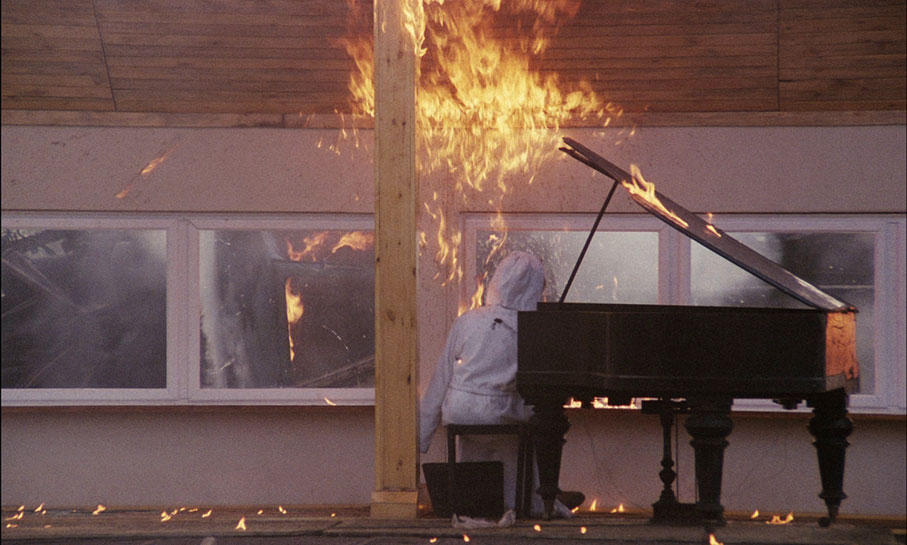
Both films were shot in black and white, with Identification Marks: None in an aspect ratio of 1.85:1 and Hands Up! In 1.66:1. Both transfers were supplied to the BFI in HD by Wytwórnia Filmów Dokumentalnych. Although Poland began to make films in widescreen ratios not long after Western Europe did, it seems that a variety of ratios were in use and the supposedly obsolete Academy Ratio (1.37:1) still being used not infrequently until at least the 1970s. Identification Marks: None is an intensely grainy film. It may have been shot in 16mm rather than 35mm, which would not be unexpected for a film using film school facilities and equipment, but I've not been able to confirm that. Hands Up!, both colour and monochrome footage, was shot in 35mm and is much sharper and less soft and grainy. The black and white footage is somewhat heightened, with the emphasis on the whites rather than the blacks and greys, though that is no doubt intentional.
Both films are in the original mono, rendered as LPCM 1.0. There's not much to say except the results are clear and well balanced. English subtitles are optionally available for the features but not the extras. Apart from the slightly misleading translation of the title of Circle of Deceit noted above, I didn't spot any errors in them.
Commentaries by Michał Olesczyk
Oleszczyk is a critic and teacher of film at the University of Warsaw. He has contributed to disc releases of other Polish films but these are I believe his debut commentaries. He packs a lot in to the relatively short length of these two features, giving plenty of context from Skolimowski's career and the situation in Poland at the time, which is particularly useful with Hands Up!, which certainly needs more explication than most films to non-Poles. Both are very much worth listening to, but do so after watching the films.
The Boxing Ichthyologist (32:21)
On the Identification Marks: None disc, Michael Brooke delivers an informative overview of Skolimowski's first Polish period, with clips from the two films in this set, as well as from Walkover and Barrier. In fact, although the emphasis is on Skolimowski's early Polish films, Brooke does cover Skolimowski's entire career, ending with a brief look at the four films that he has made more recently. It may be best to watch this after the two features here, though I don't think the clips from the two films that Second Run will be releasing are particularly spoilerific.
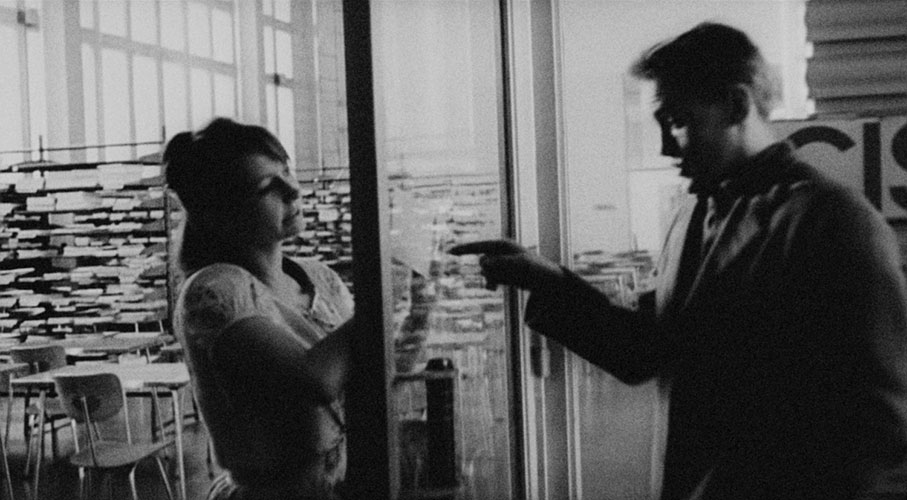
Jerzy Skolimowski interview (43:16)
Recorded in June 1983, Skolimowski is interviewed at the National Film Theatre (now the BFI Southbank). The interviewer is not identified on the disc or in the booklet, but it's Derek Malcolm. Moonlighting was then his most recent film, and Success is the Best Revenge was in preparation, to be made the following year. Skolimowski had spent most of the previous twelve months working on the script, an unusually long gestation by his standards. Taking Skolimowski through his career to date, Malcolm demurs at the director's low opinion of his own second and third films outside Poland, both literary adaptations: The Adventures of Gerard (1970) and King Queen Knave (1972). Skolimowski says that the latter proves that Vladimir Nabokov is untranslatable to the screen and that other directors (Stanley Kubrick, Tony Richardson) had made one of their worst films trying to do that. Fortunately Skolimowski thinks more highly of Deep End (1970) but it was six years before he made another film, The Shout (1978), which is one of his best. Jeremy Thomas, whose second film as producer The Shout was, had hired Skolimowski as he was a particular admirer of his films. Presumably clips from some of Skolimowski's films have been edited out, and this does end very abruptly, but there's useful information to be hand, even if much of it is replicated elsewhere in this set. This plays as an optional audio track on Hands Up! and gives way to the film's audio when it finishes.
Image galleries
These self-navigating galleries, for Identification Marks: None (4:23) and for Hands Up! (1:29) contain stills and in the case of the former, one lobby card.
Booklet
The BFI's booklet, available in the first pressing only, runs to thirty-two pages. It begins with "New School Rules", an essay by Ewa Mazierska which comes with a spoiler warning. This covers the making of both films and how Identification Marks: None stood out amongst Polish films of the time. In the Stalinist era, stories about groups rather than individuals were favoured, and this film is very much about an individual and would have no doubt have received opposition much earlier if it had been able to be made at all. However, socialist realism as a mode was tapped out by the mid 1960s, allowing films like this one. You can see Skolimowski taking advantage of this in the film's examination of the ideologies and myths which had permeated Polish life and culture, for example that of their role in World War II. Mazierska also points up the links between Skolimowski's film and film movements in other countries, not least Italian neorealism and the French New Wave. In the latter case, Jean-Luc Godard especially saw a kindred spirit in Skolimowski, and there are resemblances between Skolimowski's four Leszczyc films and François Truffaut's four features and one short about Antoine Doinel. Mazierska describes Hands Up! as a "settlement film", a settling of accounts both with Poland's past and Skolimowski's life and career up to then. This is best read after watching the film, but it certainly helps with elucidating it. Oddly, Mazierska is describing a different version of the film to that on this disc, with the flashbacks to the 1950s in black and white and the 1967 scenes "brownish", while the transfer here has all this material in black and white.
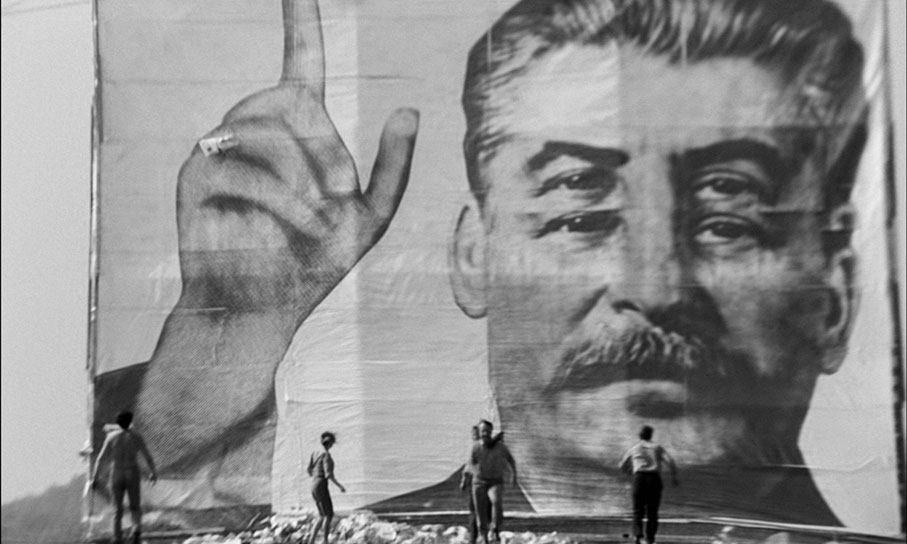
This is followed by "Back in the Saddle" by David Thompson, which looks at the now-octagenarian Skolimowski's career from the perspective of his latest film, EO. After an account of that film, Thompson goes back to the beginning of Skolimowski's career and his meeting with Andrzej Wajda. He then describes Skolimowski's exile from Poland and peripatetic life (with his wife and two sons) and career for the next three decades, before returning to Poland in the early years of the twenty-first century.
Next up is Skolimowski's 2022 list of ten films which have left their mark on him – not, by the way, a contribution to the Sight & Sound Greatest Films of All Time poll, but published in that magazine in April 2023. The booklet also contains full credits for both features and notes on the extras, plus stills.
With Identification Marks: None, made when he was just twenty-six, Jerzy Skolimowski made an immediate impact not just in Poland but overseas, being regarded as something of a one-man Polish version of the French New Wave. However, four films later (all before his thirtieth birthday), Hands Up! was banned for fourteen years and led to Skolimowski's exile from his native country. Both films are well served on this two-disc BFI Blu-ray release.
|